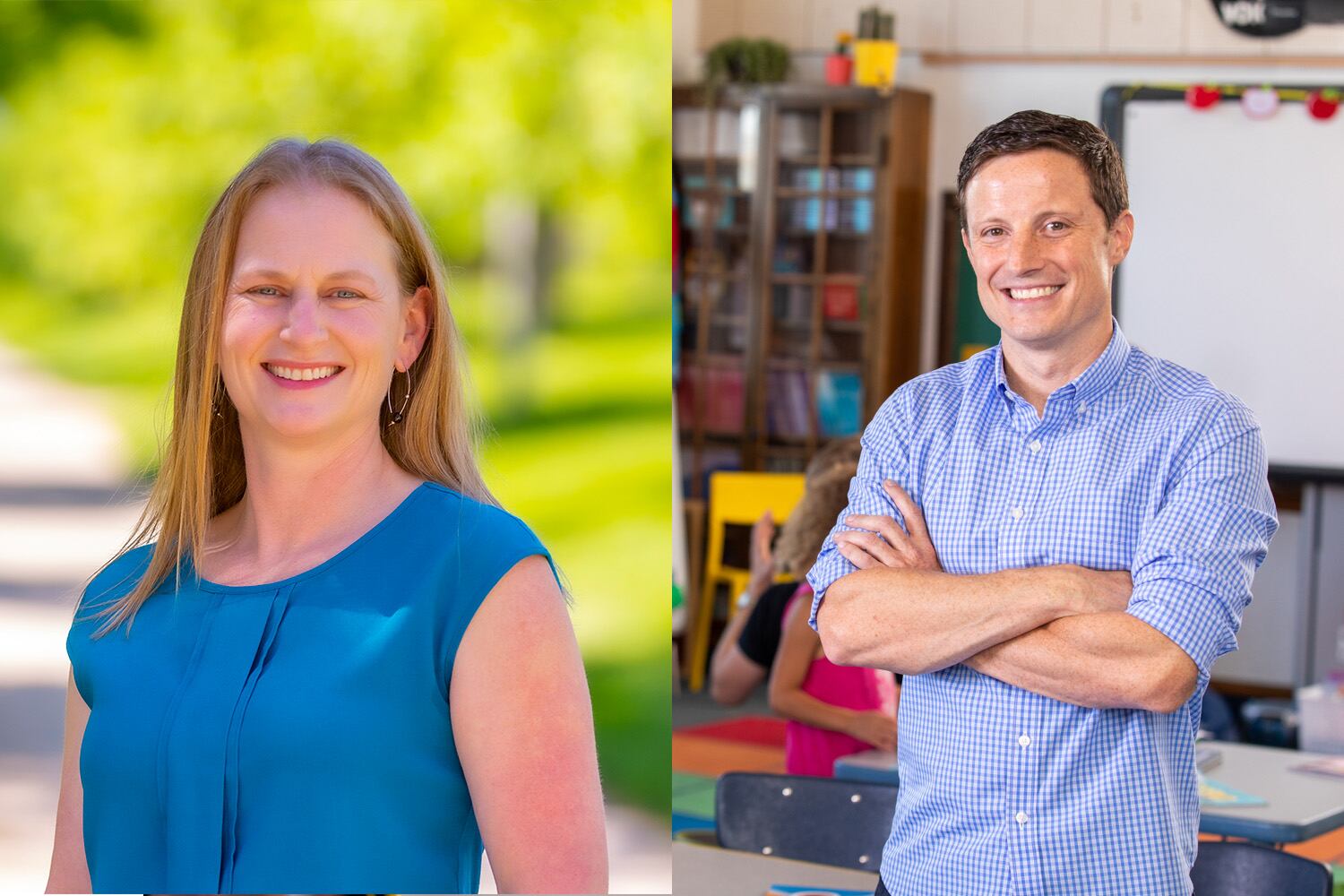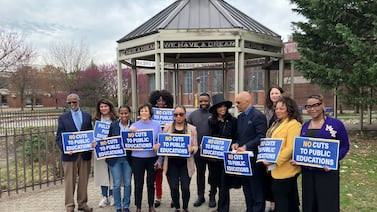Sign up for Chalkbeat Colorado’s free daily newsletter to get the latest reporting from us, plus curated news from other Colorado outlets, delivered to your inbox.
Voters in southeast Denver face the choice of re-electing a school board member who has championed the teachers union’s causes, or replacing him with an educator who led a local charter school network for six years.
Scott Baldermann, 47, is the incumbent in the District 1 race, having been elected to the school board in 2019. His win was part of a historic “flip” of the board to candidates backed by the Denver teachers union. Baldermann is the father of two Denver Public Schools students and owns a small software company that makes a heart rate tracking app for group fitness classes.
Kimberlee Sia, 47, is challenging Baldermann for his seat. She also has two children in DPS and was most recently the head of the Colorado “I Have a Dream” Foundation, which runs after-school and summer programming in DPS. She has worked as a teacher and principal, and was the CEO of the KIPP Colorado Public Schools charter network from 2013 to 2019.
District 1 includes many of the city’s whitest and wealthiest neighborhoods. Only 25% of students in DPS are white, but district data shows that 48% of students in District 1 last year were white.
Three of the seven Denver school board seats are up for grabs Nov. 7. All of the current board members were backed by the teachers union, but they’ve split on whether police belong in schools and how much autonomy principals should have. They’ve also struggled at times to get along. The election won’t change the balance of power on the board, but new members will change the interpersonal dynamic and potentially the political one as well.
The school board hires and evaluates the superintendent, sets policy, and votes on controversial issues, such as whether to open new schools or close existing ones. The board voted this year to close three schools with low enrollment, a decision it will likely face again as the number of children living in Denver continues to decrease.
Where the candidates stand on school closures, police
Baldermann steers clear of interpersonal conflict and does not speak much in public board meetings. When he does, it’s often to read a statement he’s prepared about how he will vote. But he’s one of the board’s most active members when it comes to writing policy proposals.
“The good work is boring,” Baldermann said in an interview.
Sia and Baldermann vehemently disagree on a policy Baldermann co-authored to limit the autonomy of district-run innovation schools. Under state law, innovation schools can waive certain district policies, state laws, and parts of the teachers union contract.
The original version of the policy would have required innovation schools in DPS to follow the entire union contract and the state law that grants teachers Colorado’s version of tenure, among other changes. The board eventually passed a scaled-back version of the policy last year — and then backtracked even more. But innovation schools in DPS now have to abide by the state’s teacher tenure law and pay teachers according to the union contract salary schedule.
Baldermann said it’s among the things he’s most proud of. “I’m not against innovative practices,” he said, “but not at the expense of teachers’ statutory and collective bargaining rights.”
Sia, meanwhile, has said she disagrees so much that it’s one reason she decided to run against Baldermann. “Autonomy in innovation schools is critical,” she wrote in Chalkbeat’s candidate questionnaire.
Teachers at innovation schools must vote to approve their school’s waivers. While Baldermann described the board’s new policy as protecting teachers’ rights, Sia has said that limiting the waivers “actually diminishes the innovations that teachers themselves had voted on.”
If elected, Sia wrote in Chalkbeat’s questionnaire that she would “protect the autonomies of innovation schools” by ensuring board policies don’t contradict the schools’ waivers.
Baldermann also wrote a pair of proposals currently under consideration that would deal with declining enrollment in DPS by capping enrollment at some schools, adjusting attendance boundaries, and setting timelines and other rules for school closures. The proposals say DPS should inform communities about “the positive implications of proceeding and the negative implications of not proceeding” with merging under-enrolled schools.
Sia has acknowledged that school closures are likely inevitable. But she said she opposes capping school enrollment and frequently adjusting attendance boundaries for fear of frustrating families. She agrees that the board should follow a set process and timeline for closures, though she said the community should be more involved in the decisions.
Baldermann authored the policy to permanently return police officers known as school resource officers, or SROs, to DPS schools after a March shooting inside East High School. He’d voted in 2020 to remove SROs over concerns about the over-policing of Black students, but he said the increase in gun violence in and around schools this year changed his mind.
“This is about deterrence,” he said at a June meeting before the board voted 4-3 to bring back SROs. “If it stops one kid from bringing a loaded gun into a school, I think it’s worth it.”
Sia largely agrees with Baldermann on SROs. She has said she supports the board’s decision to bring SROs back this year. But she has also said she would have voted to remove them in 2020 due to over-policing concerns if there had been a plan in place for operating without them. That’s where the board and the district dropped the ball, she said.
SROs “should not have been removed in the first place without a clear plan in place to be able to support schools,” Sia said at a recent debate co-sponsored by Chalkbeat Colorado.
Who has endorsed them
Baldermann is endorsed by the teachers union, the Denver Classroom Teachers Association. The union also endorsed him during his first campaign in 2019, and President Rob Gould said in an interview that doing it again was an easy decision.
“The candidates that we’re supporting are the incumbents that are the ones getting the work done,” Gould said. “When we think about Scott, that’s been his focus.”
Sia is endorsed by Denver Mayor Mike Johnston and by Denver Families Action, the political arm of an organization called Denver Families for Public Schools, formed in 2021 with the backing of several local charter school networks.
Denver Families CEO Clarence Burton said his organization is backing candidates “with decades of experience working in our schools or in our communities.” He said that’s “what’s needed to repair the relationship between the community and school board going forward.”
Endorsements often come with money. An independent expenditure committee associated with Denver Families Action has been spending big in the last month on digital advertising and a flurry of mailers, including some attack ads. The committee also spent $250,000 on TV ads, which is unheard of in Denver school board races. Baldermann largely self-funded his 2019 campaign, and he had contributed $77,000 to his own campaign as of Oct. 31 this year.
In DPS politics — and especially in school board elections — the Denver teachers union is often on one side, and groups supportive of charter schools are on the other.
Charters are funded with public dollars but run by independent nonprofit boards, not by DPS. Supporters say charter schools’ autonomy allows them to be innovative. Critics say charters “privatize” public education and siphon students from traditional schools.
Of all the candidates running for school board this year, Baldermann and Sia have the starkest opposing views on charter schools and school choice, which allows students to apply to attend any school they want.
Baldermann has long been critical of charters and choice. His criticisms include that charter school teachers do not need to be licensed, that their independent boards can vote to close the schools — and have — with little advance notice to families, and that school choice creates competition that often results in schools spending money on marketing that he says should be used for the classroom.
“In my first term, nine charter schools closed,” Baldermann said at a recent debate. “It is too risky for us to continue down the path where we have alternate governance models that function more as businesses that close [schools] as if they are a business.”
Sia was head of the local chapter of the national KIPP school network, overseeing six schools in Denver, and was on the board of the Colorado League of Charter Schools from 2018 through June, including a yearlong stint as board chair. She is still a board member of a homegrown Denver charter school network called University Prep.
One of Sia’s children attends a charter school and the other attends a district-run school. She volunteers on parent committees at both schools. She has also noted that she was president of a teachers union in a small school district in California.
“I believe we should strengthen all our schools,” Sia said at a debate.
She emphasized “holding all of our schools to the same levels of accountability” and ensuring “that we are working with the teachers, families, students at those schools to figure out, ‘How can we collaborate and learn from each other?’”
For more about the candidates, read our profiles here:
Watch the candidates debate here.
And read — in their own words — how they answered six questions about DPS here.
Melanie Asmar is a senior reporter for Chalkbeat Colorado, covering Denver Public Schools. Contact Melanie at masmar@chalkbeat.org.




